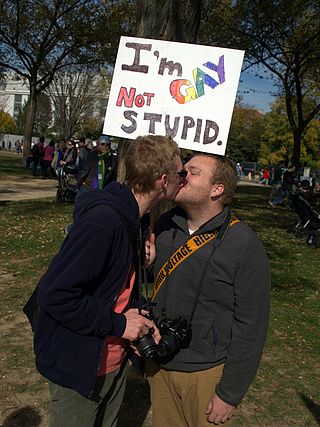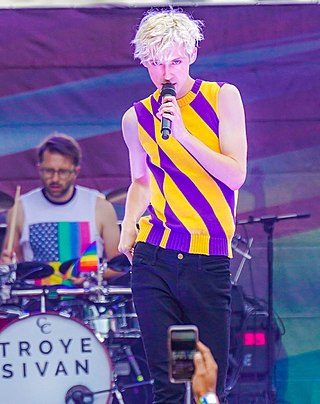A chickenhawk or chicken hawk is slang used in American and British gay culture to denote older males who prefer younger males for partners, who may less often be called "chickens", [1] i.e., the prey of the chickenhawk. [2] Other variations include chicken queen [3] and chicken plucker. [2]
It is sometimes used as a disparaging vulgarity within the LGBTQ community, or seen as a slur against people in that community. The label can be applied to a man who seeks partners with the look of someone young, regardless of their target's age. [4] [5]
"Chickenhawk" also indicates a man who uses underage boys for his sexual pleasure. The usage was publicized by members of the controversial group NAMBLA in the 1994 documentary film Chicken Hawk: Men Who Love Boys ,[ citation needed ] [6] although Time magazine reported it in this sense in 1975. [3]
The use and significance of this term have been the subject of academic discussions [7] [8] and popular reports.

A fag hag is, in gay slang, a woman who associates either mostly or exclusively with gay and bisexual men. The phrase originated in gay male culture in the United States and was historically an insult. Some women who associate with gay men object to being called fag hags while others embrace the term. The male counterpart, for heterosexual men who have similar interpersonal relationships with gay and bisexual men, is fag stag.

The LGBTQ community is a loosely defined grouping of lesbian, gay, bisexual, transgender, and queer or questioning individuals united by a common culture and social movements. These communities generally celebrate pride, diversity, individuality, and sexuality. LGBTQ activists and sociologists see LGBTQ community-building as a counterweight to heterosexism, homophobia, biphobia, transphobia, sexualism, and conformist pressures that exist in the larger society. The term pride or sometimes gay pride expresses the LGBTQ community's identity and collective strength; pride parades provide both a prime example of the use and a demonstration of the general meaning of the term. The LGBTQ community is diverse in political affiliation. Not all people who are lesbian, gay, bisexual, or transgender consider themselves part of the LGBTQ community.
Femme is a term traditionally used to describe a lesbian woman who exhibits a feminine identity or gender presentation. While commonly viewed as a lesbian term, alternate meanings of the word also exist with some non-lesbian individuals using the word, notably some gay men and bisexuals. Some non-binary and transgender individuals also identify as lesbians using this term.
LGBTQ slang, LGBTQ speak, queer slang, or gay slang is a set of English slang lexicon used predominantly among LGBTQ+ people. It has been used in various languages since the early 20th century as a means by which members of the LGBTQ+ community identify themselves and speak in code with brevity and speed to others. The acronym LGBT was popularized in the 1990s and stands for Lesbian, Gay, Bisexual, and Transgender. It may refer to anyone who is non-heterosexual or non-cisgender, instead of exclusively to people who are lesbian, gay, bisexual, or transgender. To recognize this inclusion, a popular variant, LGBTQ, adds the letter Q for those who identify as queer or are questioning their sexual or gender identity.

Records of men who have sex with men in Japan date back to ancient times. Western scholars have identified these as evidence of homosexuality in Japan. Though these relations had existed in Japan for millennia, they became most apparent to scholars during the Tokugawa period. Historical practices identified by scholars as homosexual include shudō (衆道), wakashudō (若衆道) and nanshoku (男色).
Chickenhawk may refer to:

LGBTQ culture is a culture shared by lesbian, gay, bisexual, transgender, and queer individuals. It is sometimes referred to as queer culture, LGBT culture, and LGBTQIA culture, while the term gay culture may be used to mean either "LGBT culture" or homosexual culture specifically.

Terms used to describe homosexuality have gone through many changes since the emergence of the first terms in the mid-19th century. In English, some terms in widespread use have been sodomite, Achillean, Sapphic, Uranian, homophile, lesbian, gay, effeminate, queer, homoaffective, and same-gender attracted. Some of these words are specific to women, some to men, and some can be used of either. Gay people may also be identified under the umbrella term LGBT.
Fag stag and fruit fly are slang terms for a heterosexual man who either enjoys or prefers the company of, or simply has numerous friends who are, gay or bisexual people.
Over the course of its history, the LGBTQ community has adopted certain symbols for self-identification to demonstrate unity, pride, shared values, and allegiance to one another. These symbols communicate ideas, concepts, and identity both within their communities and to mainstream culture. The two symbols most recognized internationally are the pink triangle and the rainbow flag.
Gay is a term that primarily refers to a homosexual person or the trait of being homosexual. The term originally meant 'carefree', 'cheerful', or 'bright and showy'.
Chicken can be used, usually by gay men referring to other gay men, to mean a young gay man or young-appearing gay man.
Fruit, fruity, and fruitcake, as well as its many variations, are slang or even sexual slang terms which have various origins. These terms have often been used derogatorily to refer to LGBT people. Usually used as pejoratives, the terms have also been re-appropriated as insider terms of endearment within LGBT communities. Many modern pop culture references within the gay nightlife like "Fruit Machine" and "Fruit Packers" have been appropriated for reclaiming usage, similar to queer.
Troll and trolling are slang terms used almost exclusively among gay men to characterize gay, bisexual and questioning or bi-curious men who cruise or "wander about looking" for sex or potential sex partners or experiences "in a notably wanton manner and with lessened standards of what one will accept in a partner." The term can be used positively or negatively depending on the speaker, usage and intent and can describe the person or the activity. Although often referring to "an unattractive older gay man" and although troll as a slur "is primarily a visual, not a behavioral" judgment, the phrases can be used for anyone who is trolling, regardless of the putative troll's age or perceived attractiveness.

Twink is gay slang for a man who is usually in his late teens to twenties whose traits may include a slim to average physique, a youthful appearance, little or no body hair, and flamboyancy. Twink is used both as a neutral descriptor, which can be compared with bear, and as a pejorative.
LGBT linguistics is the study of language as used by members of LGBTQ communities. Related or synonymous terms include lavender linguistics, advanced by William Leap in the 1990s, which "encompass[es] a wide range of everyday language practices" in LGBT communities, and queer linguistics, which refers to the linguistic analysis concerning the effect of heteronormativity on expressing sexual identity through language. The former term derives from the longtime association of the color lavender with LGBT communities. "Language", in this context, may refer to any aspect of spoken or written linguistic practices, including speech patterns and pronunciation, use of certain vocabulary, and, in a few cases, an elaborate alternative lexicon such as Polari.
Chicken Hawk: Men Who Love Boys is a 1994 American documentary film produced, written and directed by Adi Sideman, who founded YouNow in 2011. The film profiles members of the pedophile/pederasty organization North American Man/Boy Love Association (NAMBLA) who discuss sexual relationships between men and boys below the age of consent.
LGBTQ culture in Japan has recently begun to distinguish. The Japanese adopted the English term gender to describe cultural concepts of feminine and masculine. Previously, sei was used to distinguish the binary biological sexes, female and male, as well as the concept of gender. Ai Haruna and Ayana Tsubaki, two high-profile transgender celebrities, have gained popularity and have been making the rounds on some very popular Japanese variety shows. As of April 2011, Hiromi, a fashion model, came out as a lesbian. There is a genre of anime and manga that focuses on gay male romance known as yaoi.

Discrimination against gay men, sometimes called gayphobia, is a form of homophobic prejudice, hatred, or bias specifically directed toward gay men, male homosexuality, or men who are perceived to be gay. This discrimination is closely related to femmephobia, which is the dislike of, or hostility toward, individuals who present as feminine, including gay and effeminate men.

The following outline offers an overview and guide to LGBTQ topics: